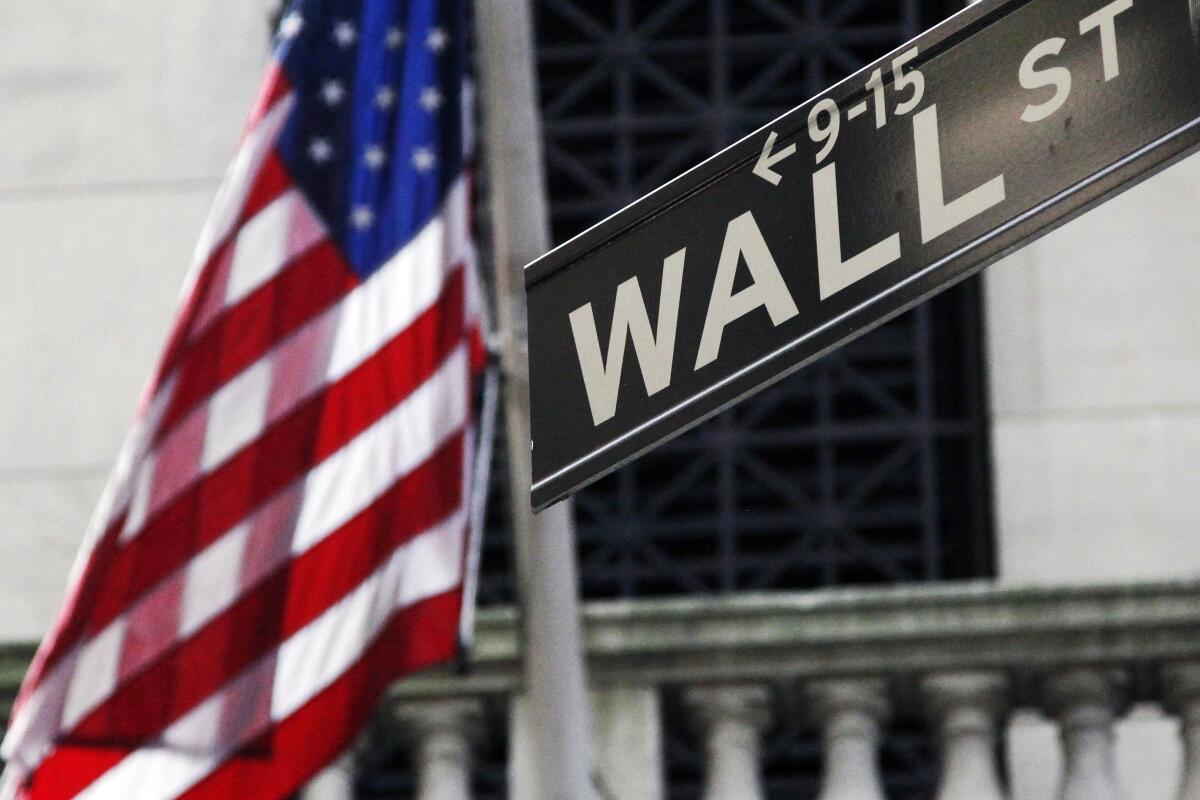A plunge in Facebook’s parent company weighs on tech stocks

- Share via
A historic plunge in the stock price of Facebook’s parent company helped yank other tech stocks lower Thursday on Wall Street, abruptly ending a four-day winning streak for the market.
The 26.4% wipeout in Meta Platforms, as Facebook’s owner is now known, erased more than $230 billion in market capitalization, easily the biggest one-day loss in history for a U.S. company. The stocks of other social media companies including Twitter and Snap also fell.
Because Meta’s value is so high, a big swing in its stock price can sink or lift broader market indexes. The Standard & Poor’s 500 index fell 2.4%, its biggest drop in nearly a year. The tech-focused Nasdaq composite gave up 3.7%, its biggest loss since September 2020. The Dow Jones industrial average, which does not include Meta Platforms, fell 1.5%.
Is Mark Zuckerberg out of ideas? He’s talking about video, again
Meta sank after forecasting revenue well below analysts’ expectations for the current quarter following privacy changes by Apple and increased competition from TikTok. It was a disappointment for a company from which investors have come to expect spectacular growth. Meta also reported a rare decline in profit due to a sharp increase in expenses as it invests in transforming itself into a virtual reality company.
The steep drop weighed on fellow social media company Twitter, which fell 5.6%. Snapchat’s parent company, Snap, sank 23.6% and Pinterest lost 10.3%. Snap soared about 60% and Pinterest vaulted about 20% in after-market trading after each reported better-than-expected results. Amazon.com jumped about 15% in after-hours trading after reporting strong fourth-quarter results despite supply chain snags.
Big technology and communications companies played a large role in driving gains for the broader market throughout the pandemic and much of the recovery in 2021, but the market seems to have shifted, said Brad McMillan, chief investment officer for Commonwealth Financial Network.
“There’s a general sense that what’s been moving the market higher is not going to take us to the next level,” McMillan said. “The question is where is the next growth engine coming from.”
The S&P 500 fell 111.94 points to 4,477.44. The Dow dropped 518.17 points to 35,111.16. The Nasdaq slid 538.73 points to 13,878.82.
Small-company stocks also fell. The Russell 2000 index lost 38.48 points, or 1.9%, to close at 1,991.03.
Communications and technology stocks had some of the biggest losses. The sectors have been behind much of the choppiness in markets since the beginning of the year as investors shift money in expectation of rising interest rates. Higher rates make shares in highflying tech companies and other expensive growth stocks relatively less attractive to investors.
Bond yields rose sharply Thursday. The yield on the 10-year Treasury note, which is used as a benchmark to set interest rates on mortgages and many other kinds of loans, rose to 1.84% from 1.76% late Wednesday.
Wall Street expects the Federal Reserve’s first interest rate hike to come in March and is cautiously watching for how the central bank paces future increases to help fight rising inflation.
“It’s not a perfect path, it’ll be bumpy, but the direction is pretty clear,” said Guy LeBas, chief fixed-income strategist at Janney Capital Management.
Inflation will probably persist until supply chains loosen and help ease costs for businesses. Still, the Fed needs to convince people that it is taking steps to fight high inflation.
“The idea is that raising short-term rates reduces the perception that inflation will be higher in the future,” LeBas said. “If the Fed successfully pulls this off then expectations won’t rise.”
In Europe, the Bank of England raised interest rates for the second time in three months, moving more quickly to tame inflation than the Fed and the European Central Bank. Meanwhile, the head of the ECB said record inflation could linger for “longer than expected” and appeared to open the door ever so slightly for a rate increase this year. Stock markets in Europe fell.
Spotify slumped 16.8% after the leading music-streaming service gave investors a weak forecast for a closely watched measure of its earnings. The company has come under pressure after Neil Young pulled his music from its platform to protest the spreading of COVID-19 misinformation by Spotify’s star podcaster, Joe Rogan. Other musicians have followed.
The losses on Wall Street ended a run of solid daily gains for the major indexes this week, though they are still on track for weekly gains. Investors had been encouraged by strong earnings reports from companies such as Apple, Exxon, UPS and Google parent Alphabet over the last few days.
Some earnings reports did draw positive reactions Thursday. Wireless carrier T-Mobile rose 10.2% after reporting strong results. Health insurer Humana rose 6.2% and upscale clothing company Ralph Lauren rose 3.5% after also reporting encouraging financial results.
But outside those bright spots, the slump for stocks was broad. Retailers, industrial companies and energy companies also fell. Household and personal goods makers eked out gains.
Investors are preparing for the latest update on the recovering jobs market. The Labor Department will release its monthly report for January on Friday.
More to Read
Inside the business of entertainment
The Wide Shot brings you news, analysis and insights on everything from streaming wars to production — and what it all means for the future.
You may occasionally receive promotional content from the Los Angeles Times.











